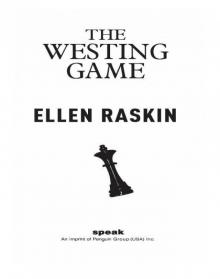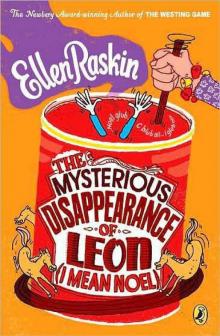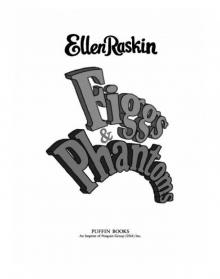- Home
- Ellen Raskin
The Westing Game
The Westing Game Read online
Table of Contents
Title Page
Copyright Page
Dedication
Introduction
Chapter 1 - SUNSET TOWERS
Chapter 2 - GHOSTS OR WORSE
Chapter 3 - TENANTS IN AND OUT
Chapter 4 - THE CORPSE FOUND
Chapter 5 - SIXTEEN HEIRS
Chapter 6 - THE WESTING WILL
Chapter 7 - THE WESTING GAME
Chapter 8 - THE PAIRED HEIRS
Chapter 9 - LOST AND FOUND
Chapter 10 - THE LONG PARTY
Chapter 11 - THE MEETING
Chapter 12 - THE FIRST BOMB
Chapter 13 - THE SECOND BOMB
Chapter 14 - PAIRS REPAIRED
Chapter 15 - FACT AND GOSSIP
Chapter 16 - THE THIRD BOMB
Chapter 17 - SOME SOLUTIONS
Chapter 18 - THE TRACKERS
Chapter 19 - ODD RELATIVES
Chapter 20 - CONFESSIONS
Chapter 21 - THE FOURTH BOMB
Chapter 22 - LOSERS, WINNER
Chapter 23 - STRANGE ANSWERS
Chapter 24 - WRONG ALL WRONG
Chapter 25 - WESTING’S WAKE
Chapter 26 - TURTLE’S TRIAL
Chapter 27 - A HAPPY FOURTH
Chapter 28 - AND THEN . . .
Chapter 29 - FIVE YEARS PASS
Chapter 30 - THE END?
Sunset Towers
The sun sets in the west (just about everyone knows that), but Sunset Towers faced east. Strange!
Sunset Towers faced east and had no towers. This glittery, glassy apartment house stood alone on the Lake Michigan shore five stories high. Five empty stories high.
Then one day (it happened to be the Fourth of July), a most uncommon-looking delivery boy rode around town slipping letters under the doors of the chosen tenants-to-be. The letters were signed Barney Northrup.
The delivery boy was sixty-two years old, and there was no such person as Barney Northrup. . . .
“In [The Westing Game] the author shows once more that no one can beat her at intrigue, at concocting marvelous absurdities.”
—Publishers Weekly
OTHER TITLES AVAILABLE IN PREMIUM EDITIONS:
SPEAK
Published by the Penguin Group
Penguin Group (USA) Inc., 345 Hudson Street, New York, New York 10014, U.S.A.
Penguin Group (Canada), 90 Eglinton Avenue East, Suite 700,
Toronto, Ontario, Canada M4P 2Y3 (a division of Pearson Penguin Canada Inc.)
Penguin Books Ltd, 80 Strand, London WC2R 0RL, England
Penguin Ireland, 25 St Stephen’s Green, Dublin 2, Ireland
(a division of Penguin Books Ltd)
Penguin Group (Australia), 250 Camberwell Road, Camberwell, Victoria 3124, Australia
(a division of Pearson Australia Group Pty Ltd)
Penguin Books India Pvt Ltd, 11 Community Centre,
Panchsheel Park, New Delhi - 110 017, India
Penguin Group (NZ), 67 Apollo Drive, Rosedale, North Shore 0632, New Zealand
(a division of Pearson New Zealand Ltd)
Penguin Books (South Africa) (Pty) Ltd, 24 Sturdee Avenue,
Rosebank, Johannesburg 2196, South Africa
Registered Offices: Penguin Books Ltd, 80 Strand, London WC2R 0RL, England
First published in the United States of America by E. P. Dutton,
a division of Penguin Books USA, Inc., 1978
Published by Puffin Books, 1992
Reissued, 1997
This edition published by Speak, an imprint of Penguin Group (USA) Inc., 2008
Copyright © Ellen Raskin, 1978
eISBN : 978-1-101-15745-9
http://us.penguingroup.com
■ FOR JENNY who asked for a puzzle-mystery ■ AND SUSAN K.
INTRODUCTION
Until 1970, Ellen Raskin was considered an illustrator, not an author, although she had written the texts of her notable picture books, such as Nothing Ever Happens on My Block; And It Rained; and Spectacles. And until 1969, I didn’t really know her, although when I was the children’s-book editor at Holt, Rinehart and Winston, she had illustrated Books: A Book to Begin On, by Susan Bartlett, and Come Along!, by Rebecca Caudill—as well as doing for us some of the one thousand book jackets of which she was so proud.
Our friendship really began in the smoking car (like the title character of Moe Q. McGlutch, Ellen smoked too much) of a Pennsylvania Railroad train en route from New York to Philadelphia, where we were both speaking on a panel. I stopped to say hello, and she said, “I’m sitting here alone because I’m so nervous. I hate speaking.” “I hate it, too,” I said, “and I’ve given up smoking.” In the depressed gloom that followed this exchange, the beginning of a bond was formed.
That same year I moved from Holt to E. P. Dutton. Their office was located at Union Square and Seventeenth Street, only a short walk from Ellen’s apartment on Eighth Street, and we got together more often. One day, Ellen confided that she had always wanted to adapt Goblin Market, by Christina Rossetti, as a picture-book text. I thought of the lavishly rich visual details of the poem, and I longed to see how she would illustrate it. ”Would you do the book for me?” I asked. “Yes,” she answered. “Jean [Jean Karl, her editor at Atheneum] doesn’t want it.” Ellen was always candid. So she did do it—her first book for Dutton. One of her exquisitely intricate paintings for that book now hangs on my wall.
We often talked about our lives, and I particularly loved stories about her family and how she and her parents and sister drove around the country during the Great Depression so her father could look for work, an epic safari that took them from Milwaukee to California. “You should write a book about growing up in the Depression,” I told her.
And she did. But it was not exactly the semiautobiographical young-adult novel I had in mind. Instead, about a year later she showed up in my office with the manuscript of The Mysterious Disappearance of Leon (I mean Noel). I loved it. Who could not love a book with the immortal line “Grape Mrs. Carillon.” But it was not about the Great Depression. Or was it??
Ellen went on to write Figgs & Phantoms, a many-layered, intricately plotted, and deeply touching book. And then her delicious tribute to Sherlock Holmes, The Tattooed Potato and Other Clues. By this time she had moved from Eighth Street, and the book was set in her new home at 12 Gay Street in New York’s Greenwich Village, a charming nineteenth-century brick house that Ellen and her husband, Dennis Flanagan, the editor of Scientific American, shared with Ellen’s daughter Susan and her husband. In the book, Ellen described the house with an artist’s visual detail, especially the way light flooded the studio from a huge skylight high in the roof.
It was there, in her studio, that she wrote and illustrated what was to be her last book, The Westing Game. As always, I didn’t know what it would be about, because Ellen didn’t know herself. She said that if she knew what was going to happen in a book, she would be too bored to write it. The carrot for her was watching the plot unfold. And, yes, she invented that incredibly complex plot of clues within clues as she went along. What a mind she had!
Mine was really put to the test in trying to keep it all straight in order to double-check her. She relied on me to do that and to tell her when her writing was “too adult.” She said, with her usual candor, that she didn’t know what children’s books were like. She read only adult ones. But I never even tried to edit her “for children.” She was too wise, too funny, too ingenious—and therefore unique—to tamper with in that way. She said that she wrote for the child in herself, but for once I think she was wrong. I think she wrote for the adult in children. She never disre spected them or “wrote down,” because she didn’t know how.
Much
has been written about Ellen’s many-faceted persona: financial wizard who made a solid piece of capital on the stock market; serious book collector; musician who set William Blake’s poetry to music she wrote herself, and who loved Schubert with a passionate reverence. But above all, she was brave. She loved the chutzpah of New Yorkers because she had it, too. When she was asked to read aloud an excerpt from The Westing Game on a program at the New York Public Library, she chose Chapter 14, including the part where Theo sings the third verse of “America, the Beautiful” to Angela. She rehearsed by singing it out loud on the subway, figuring that if she could sing it there, she could certainly perform it before a friendly audience of librarians. She could and did.
As I said, Ellen and I were bonded friends. As my friend, she told me about the illness that was the true test of her bravery. It was a disease of the connective tissues that caused her great pain. When it was in remission, she was full of energy and went full tilt—working on her many interests, including a huge vegetable garden at their cottage on the Long Island shore. But gradually the periods of remission grew shorter and shorter, and the disease claimed her life in 1984, when she was (Ellen, forgive me for telling your age) only fifty-six. Dennis held a memorial service in the studio under the skylight. After he gave the eulogy, a string quartet played Schubert’s Death and the Maiden. I still cannot hear that music without a stab of pain.
I know how glad she would be that The Westing Game has already had twenty-five good years in print, and is about to be introduced to a new generation of readers.
Readers, you are in for a treat. Get your wits about you. The Game is about to begin.
Ellen, rest in peace.
Ann Durell
New York City
1
SUNSET TOWERS
THE SUN SETS in the west (just about everyone knows that), but Sunset Towers faced east. Strange!
Sunset Towers faced east and had no towers. This glittery, glassy apartment house stood alone on the Lake Michigan shore five stories high. Five empty stories high.
Then one day (it happened to be the Fourth of July), a most uncommon-looking delivery boy rode around town slipping letters under the doors of the chosen tenants-to-be. The letters were signed Barney Northrup.
The delivery boy was sixty-two years old, and there was no such person as Barney Northrup.
Dear Lucky One:
Here it is—the apartment you’ve always dreamed of, at a rent you can afford, in the newest, most luxurious building on Lake Michigan:SUNSET TOWERS
• Picture windows in every room
• Uniformed doorman, maid service
• Central air conditioning, hi-speed elevator
• Exclusive neighborhood, near excellent schools
• Etc., etc.
You have to see it to believe it. But these unbelievably elegant apartments will be shown by appointment only. So hurry, there are only a few left!!! Call me now at 276-7474 for this once-in-a-lifetime offer.
Your servant,
Barney Northrup
P.S. I am also renting ideal space for:• Doctor’s office in lobby
• Coffee shop with entrance from parking lot
• Hi-class restaurant on entire top floor
Six letters were delivered, just six. Six appointments were made, and one by one, family by family, talk, talk, talk, Barney Northrup led the tours around and about Sunset Towers.
“Take a look at all that glass. One-way glass,” Barney Northrup said. “You can see out, nobody can see in.”
Looking up, the Wexlers (the first appointment of the day) were blinded by the blast of morning sun that flashed off the face of the building.
“See those chandeliers? Crystal!” Barney Northrup said, slicking his black moustache and straightening his hand-painted tie in the lobby’s mirrored wall. “How about this carpeting? Three inches thick!”
“Gorgeous,” Mrs. Wexler replied, clutching her husband’s arm as her high heels wobbled in the deep plush pile. She, too, managed an approving glance in the mirror before the elevator door opened.
“You’re really in luck,” Barney Northrup said. “There’s only one apartment left, but you’ll love it. It was meant for you.” He flung open the door to 3D. “Now, is that breathtaking, or is that breathtaking?”
Mrs. Wexler gasped; it was breathtaking, all right. Two walls of the living room were floor-to-ceiling glass. Following Barney Northrup’s lead, she ooh-ed and aah-ed her joyous way through the entire apartment.
Her trailing husband was less enthusiastic. “What’s this, a bedroom or a closet?” Jake Wexler asked, peering into the last room.
“It’s a bedroom, of course,” his wife replied.
“It looks like a closet.”
“Oh Jake, this apartment is perfect for us, just perfect,” Grace Wexler argued in a whining coo. The third bedroom was a trifle small, but it would do just fine for Turtle. “And think what it means having your office in the lobby, Jake; no more driving to and from work, no more mowing the lawn or shoveling snow.”
“Let me remind you,” Barney Northrup said, “the rent here is cheaper than what your old house costs in upkeep.”
How would he know that, Jake wondered.
Grace stood before the front window where, beyond the road, beyond the trees, Lake Michigan lay calm and glistening. A lake view! Just wait until those so-called friends of hers with their classy houses see this place. The furniture would have to be reupholstered; no, she’d buy new furniture—beige velvet. And she’d have stationery made—blue with a deckle edge, her name and fancy address in swirling type across the top: Grace Windsor Wexler, Sunset Towers on the Lake Shore.
Not every tenant-to-be was quite as overjoyed as Grace Windsor Wexler. Arriving in the late afternoon, Sydelle Pulaski looked up and saw only the dim, warped reflections of treetops and drifting clouds in the glass face of Sunset Towers.
“You’re really in luck,” Barney Northrup said for the sixth and last time. “There’s only one apartment left, but you’ll love it. It was meant for you.” He flung open the door to a one-bedroom apartment in the rear. “Now, is that breathtaking or is that breathtaking?”
“Not especially,” Sydelle Pulaski replied as she blinked into the rays of the summer sun setting behind the parking lot. She had waited all these years for a place of her own, and here it was, in an elegant building where rich people lived. But she wanted a lake view.
“The front apartments are taken,” Barney Northrup said. “Besides, the rent’s too steep for a secretary’s salary. Believe me, you get the same luxuries here at a third of the price.”
At least the view from the side window was pleasant. “Are you sure nobody can see in?” Sydelle Pulaski asked.
“Absolutely,” Barney Northrup said, following her suspicious stare to the mansion on the north cliff. “That’s just the old Westing house up there; it hasn’t been lived in for fifteen years.”
“Well, I’ll have to think it over.”
“I have twenty people begging for this apartment,” Barney Northrup said, lying through his buckteeth. “Take it or leave it.”
“I’ll take it.”
Whoever, whatever else he was, Barney Northrup was a good salesman. In one day he had rented all of Sunset Towers to the people whose names were already printed on the mailboxes in an alcove off the lobby:
Who were these people, these specially selected tenants? They were mothers and fathers and children. A dressmaker, a secretary, an inventor, a doctor, a judge. And, oh yes, one was a bookie, one was a burglar, one was a bomber, and one was a mistake. Barney Northrup had rented one of the apartments to the wrong person.
2
GHOSTS OR WORSE
ON SEPTEMBER FIRST, the chosen ones (and the mistake) moved in. A wire fence had been erected along the north side of the building; on it a sign warned:NO TRESPASSING—Property of the Westing estate.
The newly paved driveway curved sharply and doubled back on itself rather than br
each the city-county line. Sunset Towers stood at the far edge of town.
On September second, Shin Hoo’s Restaurant, specializing in authentic Chinese cuisine, held its grand opening. Only three people came. It was, indeed, an exclusive neighborhood; too exclusive for Mr. Hoo. However, the less expensive coffee shop that opened on the parking lot was kept busy serving breakfast, lunch, and dinner to tenants “ordering up” and to workers from nearby Westingtown.
Sunset Towers was a quiet, well-run building, and (except for the grumbling Mr. Hoo) the people who lived there seemed content. Neighbor greeted neighbor with “Good morning” or “Good evening” or a friendly smile, and grappled with small problems behind closed doors.
The big problems were yet to come.
Now it was the end of October. A cold, raw wind whipped dead leaves about the ankles of the four people grouped in the Sunset Towers driveway, but not one of them shivered. Not yet.
The stocky, broad-shouldered man in the doorman’s uniform, standing with feet spread, fists on hips, was Sandy McSouthers. The two slim, trim high-school seniors, shielding their eyes against the stinging chill, were Theo Theodorakis and Doug Hoo. The small, wiry man pointing to the house on the hill was Otis Amber, the sixty-two-year-old delivery boy.
They faced north, gaping like statues cast in the moment of discovery, until Turtle Wexler, her kite tail of a braid flying behind her, raced her bicycle into the driveway. “Look! Look, there’s smoke—there’s smoke coming from the chimney of the Westing house.”
The others had seen it. What did she think they were looking at anyway?
Turtle leaned on the handlebars, panting for breath. (Sunset Towers was near excellent schools, as Barney Northrup had promised, but the junior high was four miles away.) “Do you think—do you think old man Westing’s up there?”

 The Westing Game
The Westing Game The Mysterious Disappearance of Leon (I Mean Noel)
The Mysterious Disappearance of Leon (I Mean Noel) Figgs & Phantoms
Figgs & Phantoms The Tattooed Potato and Other Clues
The Tattooed Potato and Other Clues